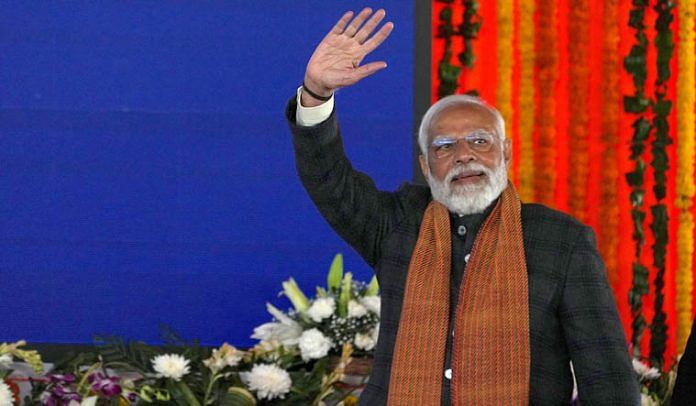Prime Minister Narendra Modi delivered a compelling address to a crowd in Arambagh, West Bengal, during a rally on 1 March 2024. As anticipated, he underscored the failures of the Trinamool Congress regarding the Sandeshkhali issue where Hindu women were reportedly harassed by party leader Sheikh Shahjahan. However, what particularly stood out in his address was his direct appeal to Muslim women. The PM stated that this time, they would also step forward to rid the state of TMC’s thugs.
Modi highlighted how the central government has consistently implemented policies and schemes for the welfare of women. He contrasted it with the TMC government’s neglect of Sandeshkhali women despite CM Mamata Banerjee and her party’s commitment to ‘Maa Mati Manush’. He urged Muslim women to express their discontent with such governance and urged them to support the BJP by exercising their voting powers. This isn’t the first instance where PM Modi has addressed Muslim women; in the past, he has stated that Muslim women have shown a willingness to support the Bharatiya Janata Party.
Why it’s significant for me
As a Pasmanda Muslim woman, being addressed as a significant voting bloc by a political party carries profound implications. It may be a very simple gesture for many, but it signifies a departure from the past, where our voices were often overlooked or dismissed. It’s a recognition of our agency and individuality, an acknowledgement that we are active participants in shaping our own destinies. That has never happened in the history of independent India.
In January 2024, the BJP launched a programme in Uttar Pradesh to reach out to 1,000 Muslim women beneficiaries of central government schemes in each district. The party conducted a series of events under the slogan “Shukriya Modi bhaijaan (Thanks Brother Modi)” and called upon Muslim women to share how the schemes changed their lives. The BJP also highlighted its work for marginalised communities, including initiatives like the ban on instant triple talaq. For years, Muslim women’s voices echoed in the void of neglect, with no political entity willing to acknowledge their plight. Decades of suffering remained unaddressed and overlooked. However, the BJP’s recognition of Muslim women as a crucial voting bloc offers a glimmer of hope for rewriting their fate.
Furthermore, Modi undertook a historic visit to Kashmir on 7 March. His visit held significance as he not only addressed Kashmiris for the first time since the abrogation of Article 370 but also visited the Hazratbal Shrine, revered by Muslims for housing the sacred relic known as ‘Moi-e-Muqqadas’ – a strand of Prophet Muhammad’s beard. During his visit, the PM inaugurated the integrated developmental project of the Hazratbal Shrine as part of the Viksit Bharat Viksit Jammu Kashmir initiative at Bakshi Stadium. This inauguration is among several projects to be launched under the Swadesh Darshan and PRASHAD (Pilgrimage Rejuvenation And Spiritual, Heritage Augmentation Drive) scheme. Such initiatives convey a strong message about India’s commitment to catering not only to the religious sentiments of the majority but also ensuring the well-being of every community, thereby dispelling the myth of marginalisation of Muslims.
Also read: Pakistan is hell on Earth for women, minorities. Mobs are demanding beheadings for blasphemy
A case in point
Atiya Sabri’s story stands as a powerful testament to the resilience and determination of women in the face of injustice. As one of the six petitioners in the instant triple talaq writ petition in UP, she bravely confronted the oppressive practice that had upended her life. Atiya’s husband, Wajid Ali, allegedly divorced her by writing ‘talaq’ thrice in a letter shortly after the birth of their second daughter in 2015. She lodged a complaint in Saharanpur court and fought the legal battle for five years. Atiya achieved a hard-won victory in her battle for alimony, with the court ordering Wajid to pay her an arrear of Rs 13.4 lakh and provide monthly maintenance of Rs 21,000, marking a significant step toward redressing the imbalance of power inherent in such situations. This victory not only symbolises Atiya’s triumph but also represents a broader shift in the legal landscape for Indian Muslim women.
While Muslim personal laws had previously limited maintenance to the period of iddat and bestowed the father with the status of natural primary guardian, the enactment of the Muslim Women (Protection of Rights on Marriage) Act 2019 has brought about a transformative change. Now, Muslim women have the right to seek maintenance in court, with the decision resting in the hands of the magistrate.
The ban on instant triple talaq and the enactment of Muslim Women (Protection of Rights on Marriage) Act 2019 have significantly reduced the abandonment of women by men and its detrimental consequences. By outlawing the instantaneous dissolution of marriage, which, sadly, is still unilateral, the government has taken a crucial step toward safeguarding the rights and dignity of Muslim women. This legislative measure has not only provided legal protection to women but has also sent a strong message that their rights and well-being cannot be disregarded.
Now, the onus falls on Muslim women to wield their votes as a means to safeguard their self-interests rather than being relegated to being mere members of a tribe and following the lead of men within their community. Muslim women must assert their agency and make informed choices that prioritise their rights, dignity, and aspirations. By exercising their voting power wisely, they can shape a future where their voices are heard and their concerns are addressed with the respect and attention they deserve.
Amana Begam Ansari is a columnist and TV news panelist. She runs a weekly YouTube show called ‘India This Week by Amana and Khalid’. She tweets @Amana_Ansari. Views are personal.
(Edited by Humra Laeeq)



